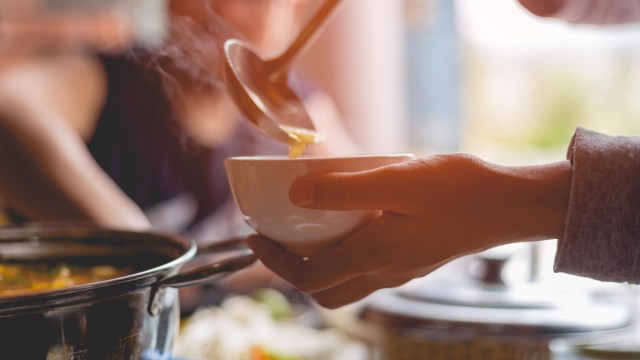CHATTANOOGA, Tenn – In my opinion, dinner is almost always the feast meal. My breakfasts and lunches are pretty light—usually simple high-protein meals that keep me going throughout the workday. But when dinner rolls around, I’m always cooking up some big meal—especially one of these 99+ Best Healthy Dinner Recipes. However, I know if I don’t have a meal plan to follow throughout the week, I fall back on some of my unhealthier dinner options. This is why I developed a few dinner hacks for weight loss that help me stay on track with my nutrition goals while still cooking up a delicious feast for the end of the day.
1 Set up your plate properly
Focus on the magical three! If you include fats, protein, and carbs with every meal, you are going to feel full from one serving. That’s right, no need for seconds! By mixing these three macronutrients, your body slows down the digestion process making you feel full for a longer period of time.
Plus, it’s also important to incorporate fiber! You’ll get fiber from a good amount of whole-grain carbs (white carbs usually are stripped of their natural fiber content), as well as the fruits and vegetables you plan on adding to your plate.
The easiest way to ensure your plate is filling and nutritious is to follow the MyPlate guidelines. Fill up half your plate with vegetables, fruit, or a combination of both. Fill the other half with a healthy carb and a protein. Then, incorporate some kind of healthy fat along with it—like sprinkled cheese on top of chicken parmesan, or sliced avocado inside a burrito.
2 If you can, serve potatoes.
Did you know potatoes are considered the best appetite suppressant ever? It’s true! According to the Satiety Index of Common Foods, published by the Department of Biochemistry at the University of Sydney, potatoes ended up being the highest in terms of satiety level (i.e. fullness) compared to other carbs. It leaves you feeling three times as full as a slice of average white bread.
Potatoes are also low in calories (about 85 grams per) and full of fiber (about 5 grams) making them the superior carbohydrate side to serve with dinner. And we hear they go great with steak.
3 Eat a variety of foods throughout the week.
While meal prep can be helpful in terms of keeping up with your weight loss goals, it doesn’t provide a ton of variety in nutrients for your body throughout the week. By eating a variety of foods, you’re guaranteed to be getting all kinds of nutrients, vitamins, and minerals that are good for your body. So if you’re one to prep, why not prep two meals (breakfast and lunch) and choose to try something new each night for dinner? This way you are still simplifying your meals and weight loss journey, while also ensuring that your body is getting a variety of nutrients throughout the week.
4 Spray, don’t toss.
Eyeballing the amount of olive oil you use when roasting veggies may make you feel like a chef, but if you’re not careful, it can add an unnecessary amount of oil to your meal—and, in return, lots of calories. Instead, spread your vegetables out on a lined baking sheet and spray them with olive oil instead. This way they get the flavoring and will still get crispy in the oven, without all of that added oil and calories.
5 Drink a glass of water while you’re cooking.
According to a study published by Clinical Nutrition Research, drinking water before consuming a meal can actually create a sensation of fullness and help you to eat less during a meal. This can help with being in tune with your satiety cues and recognizing fullness. So instead of sipping on a glass of wine while you cook, sip on two cups of water.
6 Make it colorful.
Not because you want to snag that perfect Instagram picture (although that is a huge bonus), but because eating a variety of colors means you’ll be getting all of those different phytonutrients and benefits from those different colorful fruits and veggies. According to Harvard Health, people who eat a variety of phytonutrients (which come from plants) will lower their risk of heart disease and cancer and can help prevent constipation and cholesterol issues. Plus, sticking to a variety of colors in your meals typically means getting a good amount of fiber into your diet, which is a key nutrient needed for weight loss.
7 Eat at the table.
Eating dinner in front of the television may sound tempting, but be wary. Studies show that when distracted while eating, most people will consume more calories by not paying attention to their hunger cues. One published issue from the American Journal of Clinical Nutrition shares the results of 24 different studies, which concluded that eating while distracted produced a “moderate increase” in caloric intake. By mindfully eating at the table, you’re more likely to listen to your body’s fullness signals and stop eating when you actually feel full.

